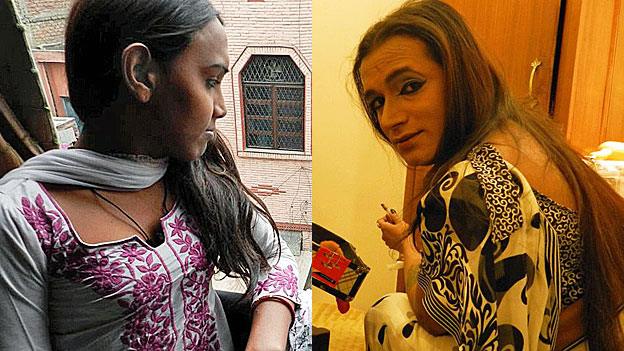Indian elections: Hope and anger in transgender community
- Published
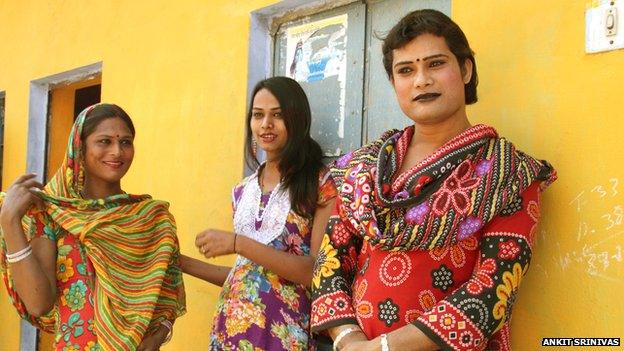
India's transgender people want to have their say in the 2014 general elections
For the first time, India's transgender people will be able to choose their gender as "other" on ballot forms following on from an Election Commission order of November 2009. BBC Monitoring's Vikas Pandey meets the community in Allahabad city to ask them about their hopes from the ongoing general election and the next government.
The stars shine brightly as I navigate a narrow, dimly-lit lane to meet Rani.
She welcomes me into her modest home in an isolated part of the dusty city of Allahabad in the plains of northern India.
A group of her friends join us, keen to have their say on the summer's most-discussed topic - general elections.
Rani and her friends are members of the transgender community who are voting in the election for the first time as the third gender - so far, they had to register as either male or female with the Election Commission.
"What does this change mean for the transgender community in India?" I ask Rani and her friends.
"It's a good initiative because we don't want to be identified as male or female, but I am not confident that this will change our image in the collective conscience of this country," she says.
Adds Babli: "The Election Commission has given us the most important aspect of our life - freedom."
'Vote with pride'
In India, a common term used to describe transgender people, transsexuals, cross-dressers, eunuchs and transvestites is hijra. They are feared and reviled in many parts of the country and often live on the fringes of society.
Babli says that she will vote with pride in this election with her new voter ID card and urges other hijras to do the same.
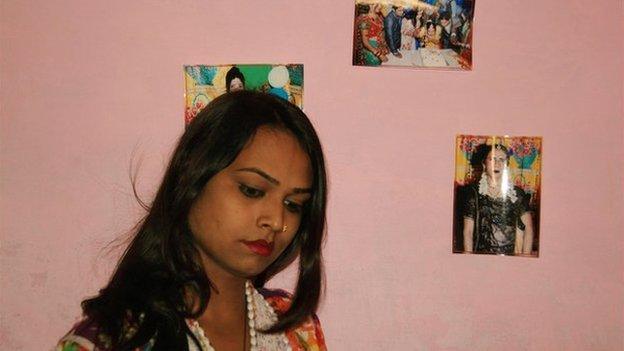
Rani thanks the poll watchdog for allowing transgender people to be registered as "others".
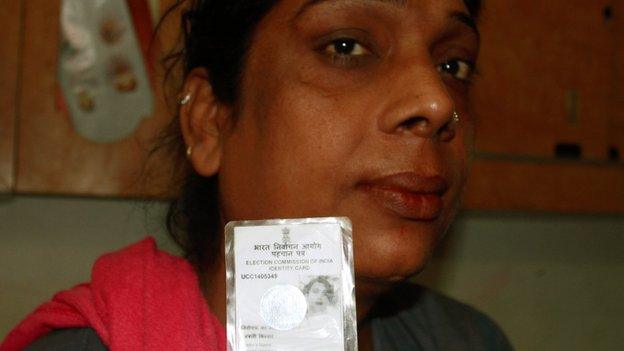
Babli hopes that people will soon accept the hijras as a part of India's society.
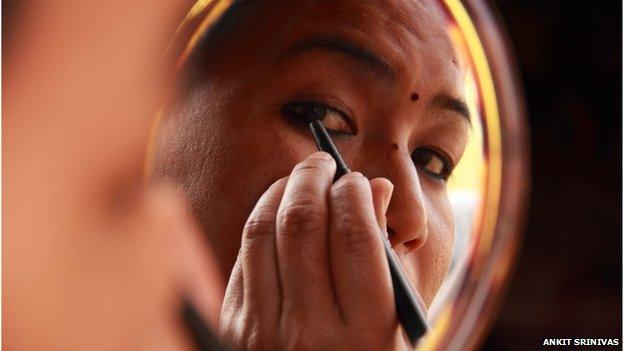
Tina wants to be treated equally.
She says her hope is that people will stop reacting negatively to the word hijra and start treating them as the "third sex".
Recently, India's Supreme Court recognised transgender people as a third gender in a landmark ruling and ordered the government to provide them with quotas in jobs and education in line with other minorities, as well as key amenities.
According to one estimate, there are nearly two million transgender people in the country and most of them are hoping that the next government will take the Election Commission and the Supreme Court's initiatives forward.
I tell Rani and her friends that the transgender people are celebrating the new initiatives in cities like Delhi and Mumbai.
Reena, one of the friends, says life in the big cities is relatively better. "Our problems in smaller towns and villages are very different from those of the transgender people living in big cities."
Reena adds that she is not against the idea of voting but does not feel confident that political parties will ever think about their problems.
"How are your problems different from those living in big cities?" I ask.
"People in Delhi and Mumbai are aware of the problems transgender people go through and are somewhat sensitive also," says Rani.
'We want recognition'
She adds that people in villages and small towns just know hijras as a community that dances during wedding ceremonies to earn money and often gets involved in prostitution.
"We too are human beings and a part of this society and we just want recognition and a normal life. I hope politicians will look at us as potential voters and make specific policies for us.
"Now even the Supreme Court has granted us recognition," she says.
Adds Tina, another transgender, that her hope is that her community will start getting basic human rights from the society.
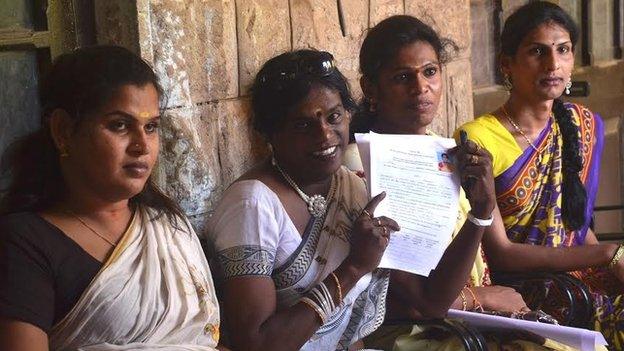
According to one estimate, there are nearly two million transgender people in India.
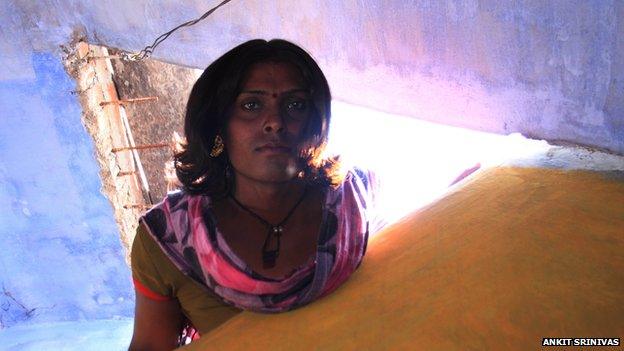
Bobby says she will not vote because "nobody really cares for transgender people".
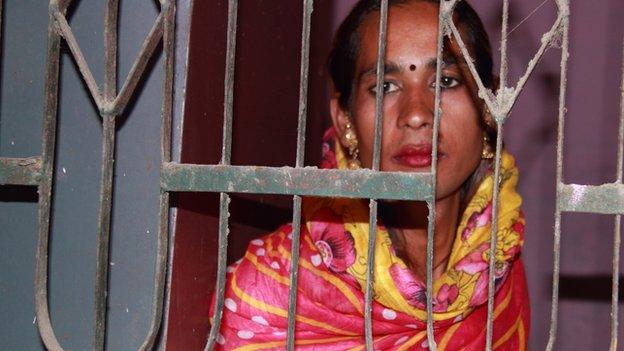
Priyanka wants young transgender people to be able to attend school.
"We are not even allowed to cremate our people in the day time. We always have to wait for the night to bid a final farewell to our friends," she says.
Reena remembers an incident when she went to a police station to complain about repeated harassments by a group of boys.
"I was thrown out of the police station. The cops behaved as if we don't have feelings and others have rights to harass us," she says.
I ask them if they will all vote? The group of eight collectively responds that they will vote in the hope that politicians may look into their problems.
I walk over to the nearby lane, that is barely getting some light from a distant street lamp, to meet another group of transgender people - Hasina, Kali, Bobby and Priyanka.
Bobby says she is not keen on voting. "That (voting) is just a nice thing to say in big cities. Do you have any idea how tough it is for us to make a living in villages?" she asks.
Priyanka, however, thinks that transgender people need to vote because issues like price rise and inflation hit them too.
She says a small thing like going to school was not possible for her because people told her that "transgender people are only meant to dance and not get educated". She wants the next government to plan special school for transgender children.
Hasina hopes the new government will make some policies for her community. "Just like other old people, many of us are not able to work after the age of 60. I want the government to make provision for a special pension for elderly transgender people," she says.
The group members say they have never been visited by any politician.
"Just look at the condition in which we live. Please tell ministers about us when you meet them," says Bobby.
- Published16 July 2012
